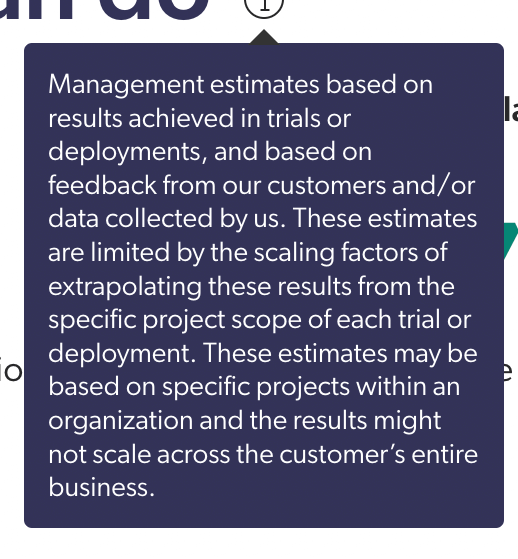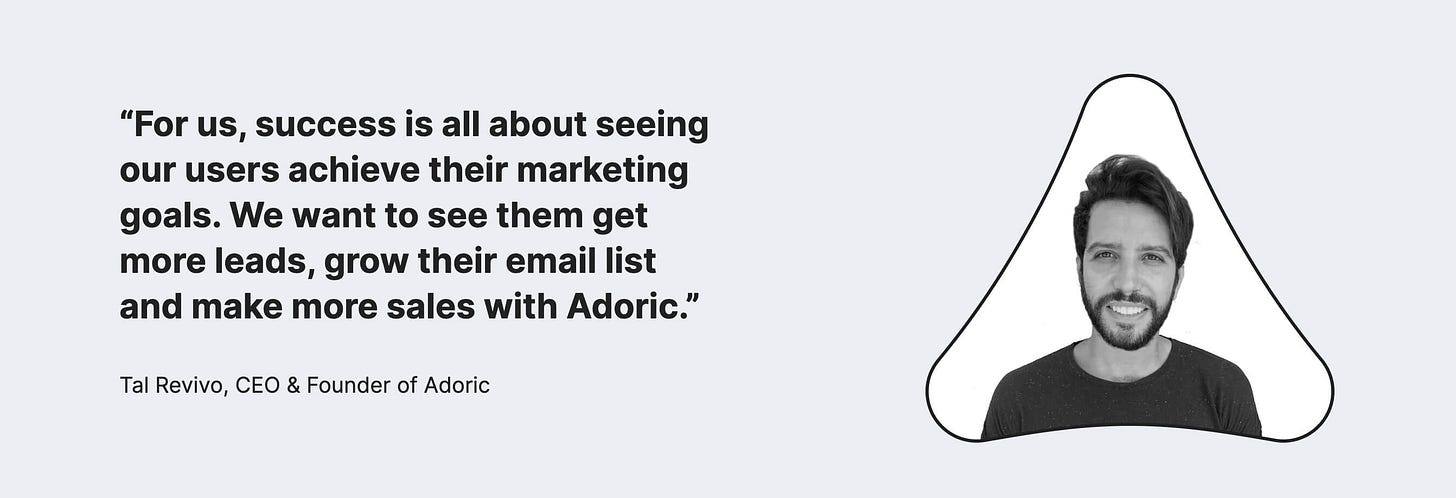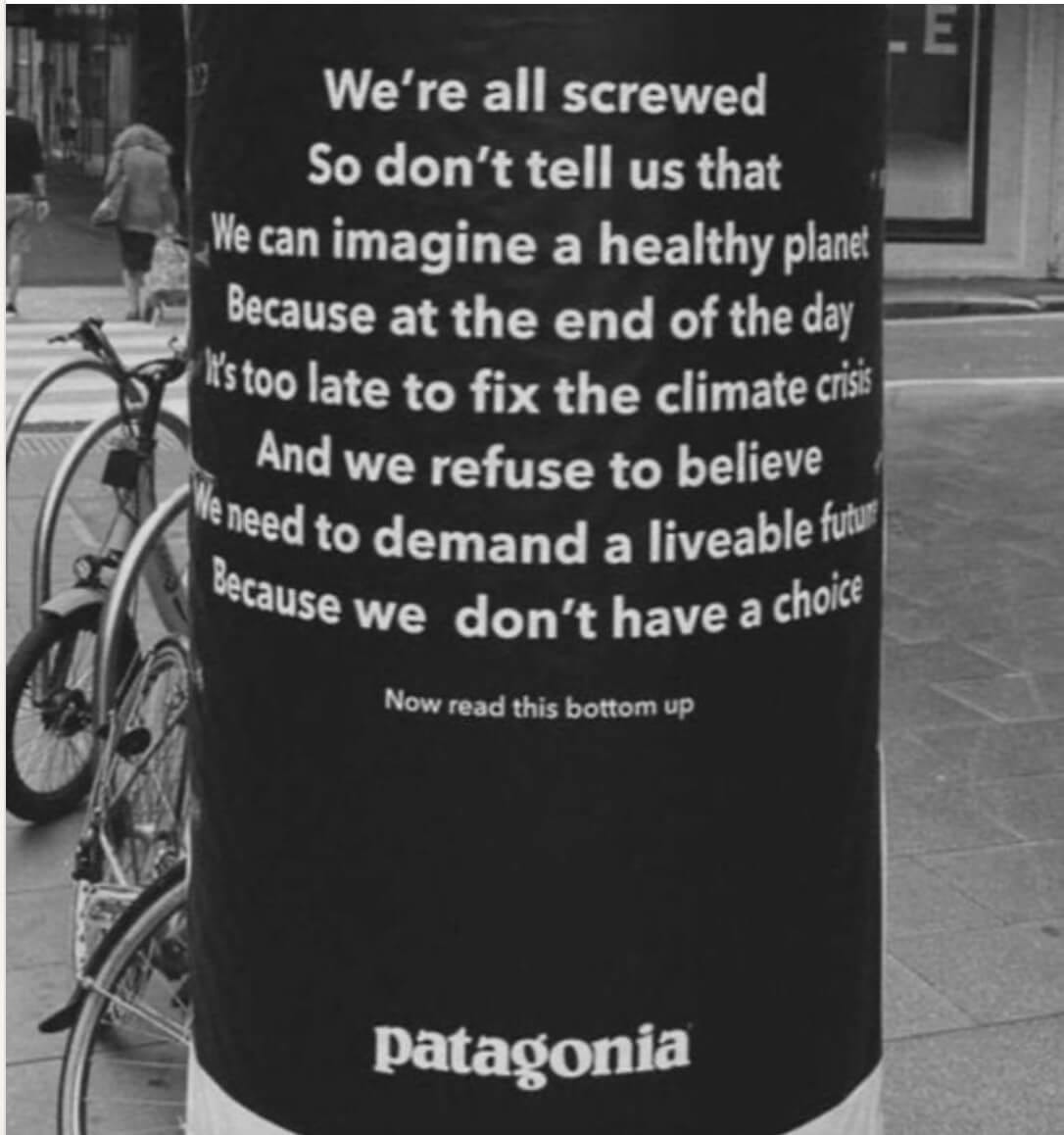15 Words Not To Use On Your Software Website, Part 1
Number 4 Is Completely Shocking!
Hello Gobbledeers,
This week we’re going to go through a list of words that you need to remove from your website right now. Or ‘RIGHT NOW!!!!!’ Either way.
But first, I’ve written a few times about how every software company includes a block on their homepage that has a bunch of numbers that are supposed to represent the amazing gains you’ll see when you buy the product. It looks like this:
¡Que impresionante!
(Guess who learned how to make an upside down exclamation point on a Mac this week?)
You may notice in the example above from site search provider Coveo that there’s a wee circle with an ‘i’ in it at the end of “This is what relevance can do”, which - had you noticed it at all - you probably assumed included a disclaimer that said, “really, these are the improvements you’ll get, no shit!”
Alas, no.
In what could be the most truthful bit of marketing I’ve ever seen on a software site, that little thingy reveals this incredibly revealing bit of legal text:
“You won’t get these results. Buy Coveo!”
Testimonials
Early-stage companies often struggle to get case studies or testimonials to list on their websites. I saw this solution from web personalization startup Adoric:
I was skimming through the page, saw the quote, and kept going. Then I went back and re-read it and realized that the testimonial quote was from Adoric’s own founder. I thought, “that took some chutzpah,” but then as I thought more about it I decided it’s brilliant. It’s not like they hid that the quote is from the founder, and it’s definitely written as if it’s from the founder (not like it’s pretending to be something it’s not). And for people who just skim the page, it looks like a testimonial. Nice job making something out of almost nothing.
If you torture yourself by reading tech company websites (as I do), you begin to notice that these companies have taken ownership of a bunch of words and phrases that, after you see them a few times, become completely meaningless.
I’ve spoken about how larger companies use their sites defensively, where they’re trying not to say anything that would spook the buyer, rather than trying to say something that would actually convince a buyer.
If you want your site visitors to actually consider what you’re saying, I’ve made a list of words you should not use. I’m shocked by how often these appear on sites - there are better and clearer ways to say all of these things (and there are writers of newsletters - like this one! - who can help you).
Today I bring you the 15 Words of Gobbledy (tm), Part 1
(Actually today I bring you 8 Words of Gobbledy…the 15 seemed too long for one newsletter…you’ll get the other [doing math in head] 7 next week).
1) Leverage - The fancier, more annoying cousin-who’s-visiting-from-his-first-year-at-Bennington of “use.” Nothing is ever achieved by using “leverage” instead of “use,” and you probably shouldn’t be using either of those, as it means you’re focusing on the tool rather than on the results. We’re on your website - we know you’re talking about the product. e.g. “Leverage Flozzio to create a world-class HR experience.”
What to use instead: Go with something like “Your team won’t stop blabbering about how much they love Flozzio”
2) Empowers - One of those words where if you stare at it long enough you start to think, “how are ‘mpow” in a row? That looks so weird. Um-poh. Um-poh. That can’t be right.” But oh, it’s right. So then how can something so right be so wrong? Like leverage, if you’re using it you’re making yourself the star of the show. e.g. “Conblabbify empowers marketers to create experiences that blah blah blah.”
What to use instead: I’d suggest “Customers spend 82% more when they come across Conblabbify recommendations.”
3) Enable - My beef is a little less with the word than with how I see it used. The tiny little hairs on my arm always stand up when I read something like “Splomrativ enables end-to-end personalization”.
What to use instead: “It’s probably possible to personalize emails without Splomrative…but why would you bother?”
4) Seamless - It’s supposed to suggest that product can easily connect to a whole bunch of different other tools (“Flontrr connects seamlessly with your marketing stack”), but whenever I see it:
a) I immediately think “Grubhub”
b) Back when SaaS tools starting becoming widely available in the ecommerce world, everyone said their integration was “just a single line of code,” and that phrase “just a single line of code” was both factually true and such a complete load of nonsense that I’ve been in meetings where people laughed when the salesperson said it. I laugh when I see “seamless integration” because it’s not true. And even if it is, I know it’s not.
5) Nouns Turned into Verbs - These are actual quotes from companies I didn’t make up:
”Use your preferred language to prototype ideas quickly”
“Action your customer data and curate onsite shopping experiences”
Just stop.
(Yes, I know those can be used as verbs. But don’t enverbenate them.)
6) Blazing Fast - Fast will suffice. It’s fast enough. Ironically, “blazing fast” is slower to read than just using “fast.” Also I think it’s supposed to be “blazingly fast.” But also it shouldn’t be that, either. Like if you were deciding between 2 products and one was “fast” and the other was “blazing fast” or “blazingly fast” or “blazing-fast software” you wouldn’t make the decision based on that. (Or if you did, that was a stupid reason to buy Qlyve.io.")
7) Robust - This little guy shows up quite often either when describing the number of integrations you have ie, “a robust set of integrations” or when describing APIs (which are often described as “Robust APIs.”). I see “Robust APIs” so often that I assumed Robust APIs were a type of API, but I believe it just suggests speed and flexibility (please let me know if I’m wrong). “Robust” is a software marketing word that people skip.
What to use instead: If you have a large number of integrations, say “All the integrations you’ll ever need - built in.”
8) Hyper-Relevant and Hyper-Personalized - At some point in the past few years somebody decided that too many companies were saying they make marketing offers more relevant and personalized. And the way they decided to address that was by claiming that their marketing tool produced “hyper-relevant” and “hyper-personalized” content, because “relevant content” is for suckers.
Adding nonsense modifiers is just a way to avoid being specific about the benefits. Unless, of course, you have Super-Hyper-Relevant recommendations. Then you should call that out.
Next Week: The Final 7 (I know you’re dying to find out!)
Something New This Week: Grammar Corner
Earlier, I mentioned search tech company Coveo. On their website they have this sentence:
“Coveo’s 17+ years of AI innovation helps industry leaders stay leaders.”
So, Gobbledy readers, I’m curious what you think:
Should the sentence read “Coveo’s 17+ years of AI innovation helps industry…” or “Coveo’s 17+ years of AI innovation help industry…”
I’m a little torn - if “17+ years” really means “experience” then “helps” is correct. If it’s saying that the actual years are helping, then it’s “help.” I can be convinced either way.
Whaddya think? Answer in the comments section. (Note: the answer cannot be “who cares?” even though that may be the correct answer.)
And a Great Example of Copywriting
(Thanks to reader TG for that one)
As always, thanks to everyone who shares Gobbledy or reaches out to say hello. Or to hire me to make their messaging great. That’s also good. I have no complaints about those people.






I love the this list so much. I feel empowered to seamlessly leverage it.
In the Smartless podcast with Jordan Peele, Jason Bateman uses a noun as a verb when he asks JP whether he "vendors out" his trailers. That is apropos of nothing but I thought it was funny. Continue.